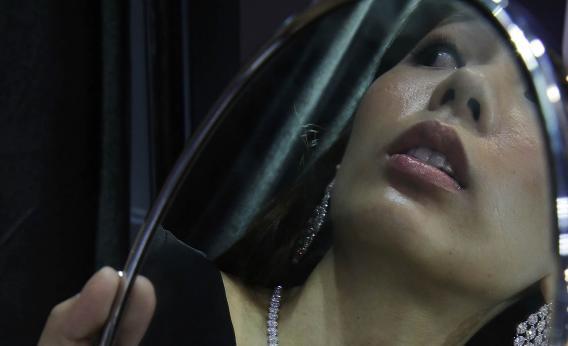Researchers at the University of Tokyo have developed a liar mirror that makes you look happier than you are. The device, called “incendiary reflection,” “works with a camera to track a person’s facial expressions in real time.” It then tweaks those expressions, subtly lifting the corners of the mouth up and crinkling the area around the eyes to approximate the beginnings of a Duchenne smile. You look in the “mirror” and see an incrementally happier you, which kicks off a cascade of happiness and ultimately makes you buy things.
The looking glass of fraud relies on facial feedback theory, or the idea that the road between emotions and facial expressions goes both ways. To wit: How you arrange your countenance informs how you feel; forcing your face into a grin can actually brighten your mood (although being told to do so will probably just infuriate you). According to Tara Kraft, a doctoral student at the University of Kansas who has authored studies on facial feedback theory, the webcam of lies might work by tapping into our impulse to mimic others’ facial expressions. We observe a joyful visage (our own) and adjust our smiling muscles to match it, which makes us happy. (Option two is that we just like looking at smiley people—no mimicry required.)
In one study, Japanese researchers led by Shigeo Toshida asked 21 volunteers to perform a neutral task and then to rate how they felt while gazing into the pane of falsification. (They did not know it was in the middle of falsifying.) When confronted by slightly happier images of themselves, the volunteers reported a greater sense of wellbeing. The video was also adjusted to modify faces in a gloomier direction—perhaps not surprisingly, people encountering more rainy-day reflections told researchers they were unhappy.
What about the “buying things” part? Each person was also given a scarf to wear and placed in front of either a regular mirror or a speculum of dissemblance. Volunteers who saw altered, sunnier figments staring back at them were more likely to be enchanted by the scarf than were members of the control group. Toshida and his colleagues believe their device, given dominion over a dressing room, “could be used to manipulate consumers’ impressions of products,” persuading people to buy clothes they might otherwise turn down.
Uh oh. Then again, as long as our mirrors are going to lie to us, who cares if we are flaunting ugly threads? Let the charade play out. If my mirror says I’m happy and my scarf is cute, I’m not about to disagree.
